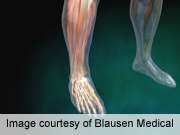(HealthDay)—When walking up and down stairs, patients with diabetic peripheral neuropathy (DPN) are slower at generating strength at the ankle and knee compared to control participants, which may increase the risk of falls, according to a study published online Oct. 14 in Diabetes Care.
Joseph C. Handsaker, from the Manchester Metropolitan University in the United Kingdom, and colleagues examined 63 participants (21 patients with DPN, 21 controls with diabetes, and 21 healthy controls) walking up and down a custom-built staircase. Analysis included assessment of speed of strength generation at the ankle and knee and muscle activation patterns of the ankle and knee extensor muscles.
The researchers found that patients with neuropathy displayed significantly slower ankle and knee strength generation than healthy controls during stair ascent and descent (P < 0.05). Ankle and knee extensor muscles were activated significantly later by patients with neuropathy during ascent and they also took longer to reach peak activation (P < 0.05). Patients with neuropathy activated the ankle extensors significantly earlier during descent, while ankle and knee extensors took significantly longer to reach peak activation (P < 0.05).
"These changes, which are likely caused by altered activations of the extensor muscles, increase the likelihood of instability and may be important contributory factors for the increased risk of falling," the authors write. "Resistance exercise training may be a potential clinical intervention for improving these aspects and thereby potentially reducing fall risk."
More information:
Abstract
Full Text (subscription or payment may be required)
Journal information: Diabetes Care
Copyright © 2014 HealthDay. All rights reserved.























